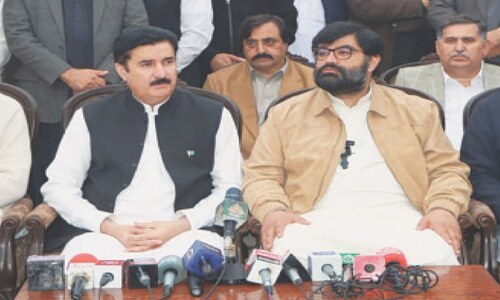PESHAWAR: Two physically challenged residents of Mardan district have petitioned Peshawar High Court to seek their right to state-paid medical treatment.
They have requested the court to declare that the State of Pakistan has failed to implement international law and various treaties (regarding disability) signed by it.
Asad Khan and Sher Alam Khan have prayed the court to declare that Article 9 (right to life) and 25 (equality of citizens) when read together cast a duty upon all public bodies to make reasonable adjustments for the benefit of the disabled persons.
Seek coherent policy for safeguarding rights of disabled people
They requested the court to direct several departments and projects of federal and provincial governments, including federal ministry of health service and KP health department, to constitute a panel and liaise with each other to formulate coherent policies/guidelines for safeguarding the constitutional rights of the disabled persons within a specified period as their abdication of responsibility is adversely impacting the fundamental rights of the petitioners.
Lawyer for the petitioners Barrister Asadul Mulk states that Pakistan is a signatory to Convention on the Rights of Persons with Disabilities and Vocational Rehabilitation and Employment (Disabled Persons) Convention, which cover the rights of disabled citizens comprehensively.
Additionally, Pakistan is a signatory to instruments such as Equality of Treatment (Social Security) Convention, International Covenant on Civil and Political Rights, and the International Covenant on Economic, Social and Cultural Right, which cover the rights of the disabled in general.
The petitioners, who claimed that they were born into poverty coupled with paraphilia and quadriplegia, respectively, stated that they were informed by medical practitioners that their condition was curable, but to treat it, they would have to incur medical cost of up to Rs150,000 each.
The petitioners state that since then, they have approached authorities at different levels, requesting financial assistance to avail a treatment, which is likely to have a life altering effect, but unfortunately the possibility of the state financing their treatment is as remote as ever.
As they failed to get appropriate response from the government departments, they approached the Human Rights Directorate of PHC, which entrusted their case to Barrister Asadul Mulk, who has now filed a comprehensive public interest constitutional petition on their names.
Barrister Asadul Mulk has, in the petition, has discussed various international treaties to which Pakistan is a signatory. In Pakistan, the number of persons living with disabilities varies between 3.3 million and 27 million, depending on whether government statistics or those of international agencies are relied upon.
He explains that unlike the Republic of South Africa, Colombia, Brazil and Argentine etc, the “right to health care” has not been entrenched in the Constitution of Pakistan, although the right to life has been mentioned.
He requests the high court to follow the lead of the European Court of Human Rights and the jurisprudence of India to recognise a limited right in favour of the most destitute class.
Barrister Mulk says that even the US, Australian and Indian constitutions do not contain an entrenched “right to health care” but the supreme courts of these countries have nonetheless made findings recognising such a right to fill legislative and executive vacuum.
He states that in its judgment reported as 2011 PLD 619, the Supreme Court of Pakistan held that “(the right to life) includes all those aspects of life which go to make a man’s life meaningful, complete and worth living. Right to life implies the right to food, water, decent environment, education, medical care and shelter”.
However, he states the Supreme Court did not lay down the minimum positive steps the state had to take to discharge its obligation in providing medical care and the state has not clarified it either.
The petitioners have also requested to direct the provincial secretary transport and the project director of Bus Rapid Transit (BRT) project to ensure to the satisfaction of the high court that the BRT is designed to be user friendly for the disabled persons.
They also request to direct all the respondents comprising different government departments and projects to forthwith either pay or alternatively bear the necessary medical expenses needed to treat the petitioners’ disabilities.
Published in Dawn, February 15th, 2018















































Dear visitor, the comments section is undergoing an overhaul and will return soon.